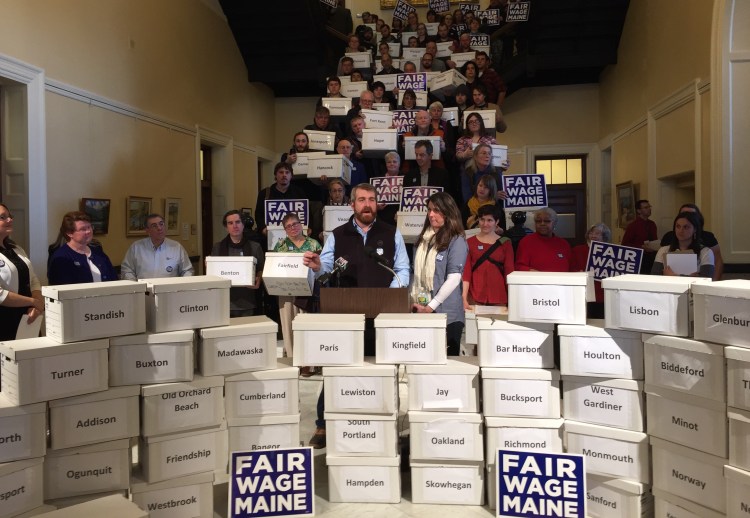AUGUSTA — Frustrated by inaction at the state and federal levels, advocates for a higher minimum wage filed more than 75,000 petition signatures Thursday to put an initiative to voters aimed at raising the statewide minimum to $12 an hour by decade’s end.
A coalition led by the Maine People’s Alliance, the Maine AFL-CIO and the Maine Small Business Coalition hopes to secure a spot on the November ballot for an initiative that would raise the minimum wage to $9 per hour in 2017, followed by annual $1 increases until 2020. The wage would then be indexed to inflation.
The 76,420 signatures verified by local election officials and filed Thursday is well above the 61,123 needed from registered Maine voters to qualify for the ballot. If certified by the Secretary of State, the proposal would join one other ballot question already headed to voters but could, ultimately, be among nearly a half-dozen initiatives competing for voters’ attention this November.
“When working Mainers make a decent living, they spend that extra money in our communities,” said Adam Lee, chairman of Lee Auto Malls, at a State House press conference attended by more than 100 supporters lugging boxes – most empty and used as props – labeled with names of Maine towns. “It’s good for the whole economy, including my business.”
Maine’s statewide minimum wage now stands at $7.50 an hour, 25 cents above the federal minimum.
The push to increase the state’s minimum wage at the ballot box follows years of failed efforts – spearheaded by Democrats, progressive groups and labor unions – to get a higher wage through the Legislature. The statewide vote would take place a year after Portland voters rejected a local referendum to increase the city’s minimum to $15 an hour. Portland city councilors approved a $10.10 minimum wage earlier in 2015, which took effect January 1.
Although more than 200 business owners support the $12-an-hour statewide initiative, the measure will face strong opposition from major business groups, including the Maine State Chamber of Commerce and the Maine Restaurant Association.
Peter Gore, vice president for government relations at the state chamber, pointed out that his organization and others supported negotiations during last year’s legislative session to pass a more modest wage increase. But Gore said jumping to $12 an hour by 2020 is “really beyond the ability of many, many small businesses.”
“It is going to increase the cost of doing business on an ongoing basis year after year and is going to be particularly detrimental to small businesses in rural areas, to restaurants and to innkeepers who have restaurants attached,” he said.
Gov. Paul LePage, a Republican whose administration has consistently opposed legislative attempts to increase the state’s minimum wage, said the proposed hike would be “devastating” to the state’s business climate.
“Raising the minimum wage, the way they are planning to do it, would put us back 25 years, it would be devastating,” LePage said Thursday during a breakfast event held by Mid-Maine Chamber of Commerce in Waterville. “It’s going to bring us up to $12 in four years, highest in the nation. You can’t attract people if you are the highest minimum wage.”
Twenty-eight other states, plus the District of Columbia, have minimum wages higher than Maine’s $7.50 minimum, according to information posted by the National Conference of State Legislatures. While several major cities – including Seattle and San Francisco – have approved hikes to $15 an hour and a handful of states began requiring $10 an hour this year, no state has yet reached the $12-an-hour mark.
According to Maine Department of Labor statistics, roughly 20,000 Mainers earned the minimum wage or less in 2013. That’s about 3 percent of the roughly 650,000 people working in the state that year.
Among those earning the minimum, 44 percent had food service jobs where tips are commonplace, and 71 percent worked part time. Fifty-two percent of those earning the minimum wage were under age 25.
The ballot initiative proposed in Maine would also increase the minimum tipped wage for restaurant workers – now pegged at $3.75 an hour – gradually until it reaches the full minimum in 2024. Several restaurant employees who spoke during Thursday’s press conference called the proposal a much-needed change.
“It’s hard to stick to a budget and be financially responsible when your wages can fluctuate drastically from one shift to the next,” said Esther Pew, a graduate student who works at a Portland restaurant. “Getting a steady paycheck from my employer, and not just tips from my customers, would be a boost for me and thousands of tipped workers, mostly women, working in restaurants all over Maine.”
The “Mainers for Fair Wages” campaign is the second organization to submit petition signatures to the Secretary of State’s office to qualify for the November ballot. Advocates for ranked-choice voting submitted petitions in October and were certified a month later.
But additional ballot initiatives are expected to follow-suit within the next several weeks.
Supporters for legalizing recreational use of marijuana have been gathering signatures for well over a year, while advocates for expanded background checks on gun sales said last week that they believe they have gathered enough signatures to qualify.
There are questions about whether the Maine Republican Party will collect enough signatures by the Feb. 1 deadline for a ballot initiative that would reduce the income tax and reform welfare. If organizers are not successful, they could still qualify for the 2017 ballot.
A recently created committee called Harness Racing Jobs Fairness, meanwhile, is collecting signatures to bring a casino to southern Maine. The group is rushing to gather the signatures needed for 2016 but could wait to qualify for the 2017 elections.
Staff writer Peter McGuire contributed to this report.
Send questions/comments to the editors.



